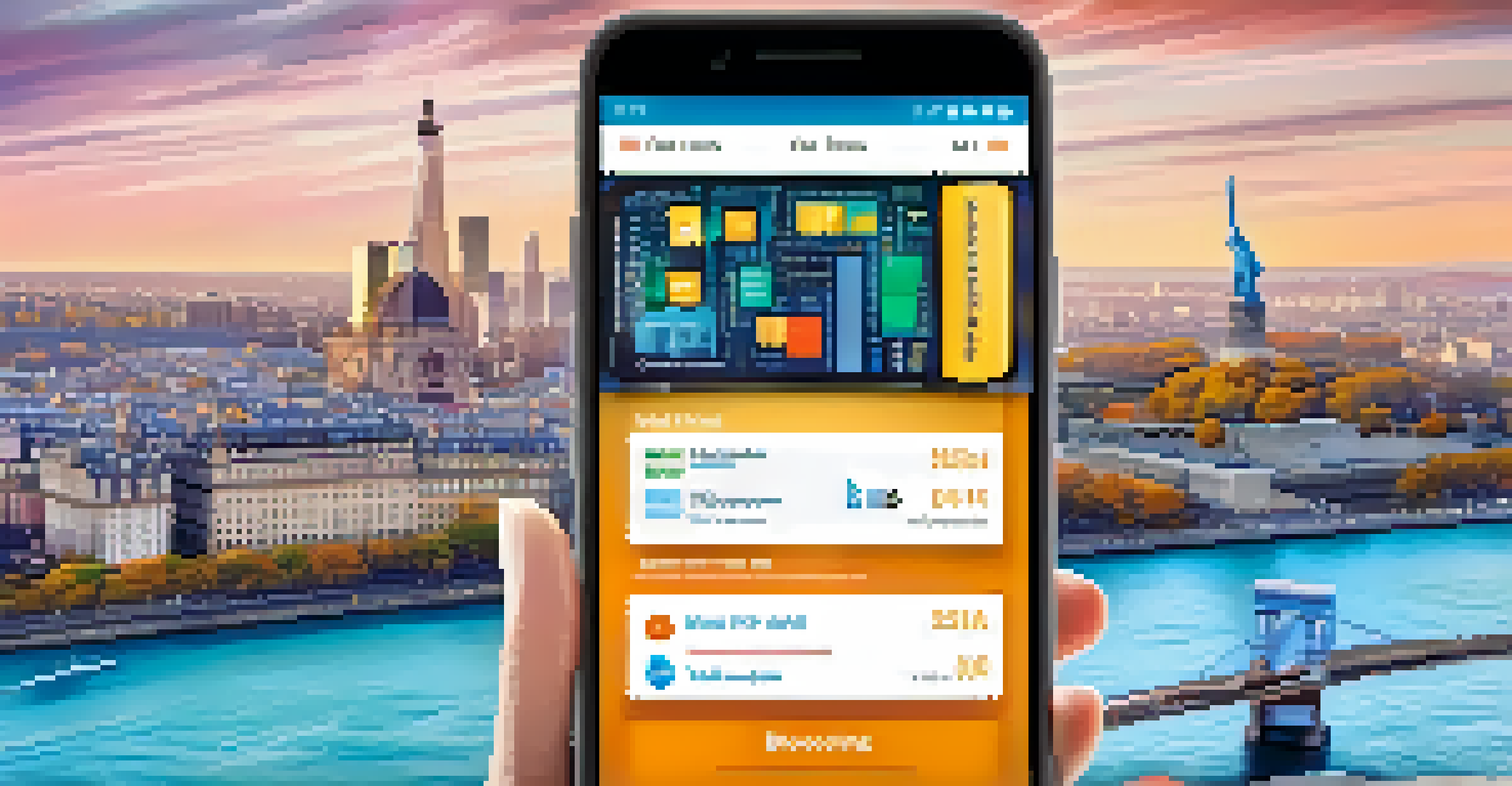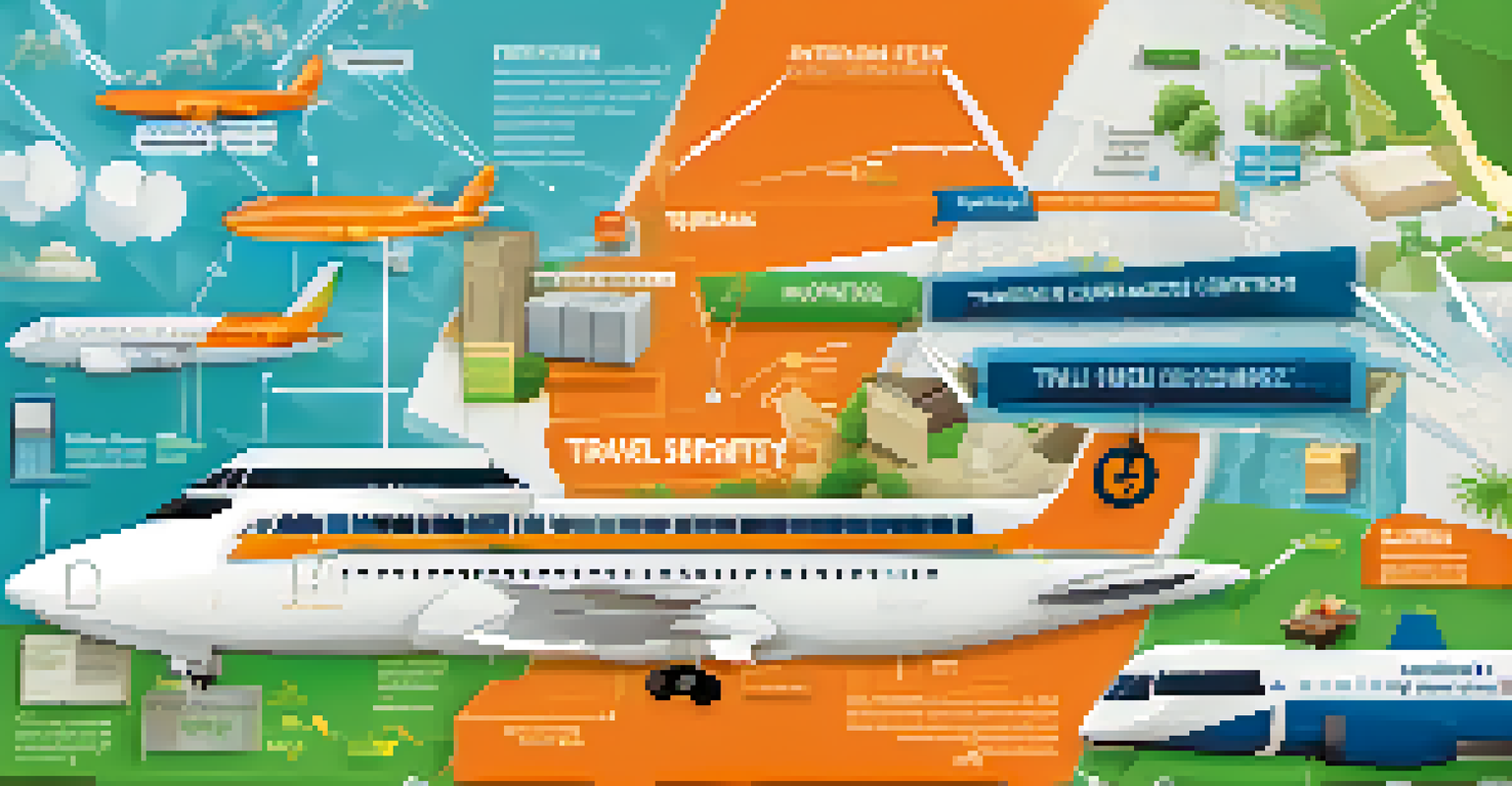How Blockchain Technology is Changing Travel Security

Understanding Blockchain Technology in Travel Security
Blockchain technology is often associated with cryptocurrencies, but its applications extend far beyond that. At its core, blockchain is a decentralized ledger that records transactions across multiple computers. This means that once data is entered, it cannot be easily altered, which provides a high level of security and transparency. In the travel industry, this can significantly enhance security measures for travelers and service providers alike.
Blockchain is the ultimate solution for secure, transparent transactions.
Travelers often face risks such as identity theft, fraud, and misinformation. By utilizing blockchain, travel companies can securely store and share passenger data without the fear of breaches that typically accompany centralized databases. For instance, with secure digital identities stored on the blockchain, travelers can verify their identities seamlessly at various checkpoints, enhancing both security and convenience.
Moreover, blockchain can streamline the verification processes for travel documents like visas and tickets. Instead of relying on paper documents that can easily be lost or forged, blockchain provides a reliable way to authenticate these documents. This not only speeds up travel but also adds an extra layer of security, ensuring that each transaction is valid and traceable.
Enhancing Identity Verification through Blockchain
Identity verification is a critical aspect of travel security, and blockchain offers a transformative approach. Traditional methods often involve multiple checks and can be prone to errors or fraud. With blockchain, travelers can use a single secure digital identity that is verified across various platforms, making the process smoother and more reliable. Imagine walking through an airport where your identity is automatically verified through a secure blockchain system, eliminating long queues and delays.

This technology can also empower travelers by giving them control over their personal data. Instead of sharing sensitive information with multiple entities, travelers can selectively share their blockchain-verified identity with airlines, hotels, and immigration authorities. This not only enhances security but also minimizes the risk of data falling into the wrong hands.
Blockchain Enhances Travel Security
By providing a decentralized ledger, blockchain significantly improves security in identity verification and data storage for travelers.
Furthermore, blockchain facilitates real-time updates to identity verification, which is especially beneficial in the event of stolen passports or compromised personal information. If your identity is flagged, updates can be made instantly across the network, ensuring that your travel plans are not hindered by outdated or erroneous information.
Secure Transactions: Blockchain in Travel Payments
Payment security is another area where blockchain is making waves in the travel industry. Traditional payment systems often involve intermediaries that can delay transactions and introduce vulnerabilities. Blockchain technology allows for direct peer-to-peer transactions without the need for intermediaries, resulting in faster and more secure payments. This means that whether you're booking a flight or paying for a hotel room, your transactions are processed quickly and safely.
The real power of blockchain technology lies in its ability to provide trust and transparency in digital transactions.
Additionally, blockchain enhances transparency in transactions. Each transaction is recorded on a public ledger, which helps prevent fraud and double-spending. For travelers, this means peace of mind knowing that their payments are secure and traceable. If an issue arises, such as a disputed charge, the blockchain serves as an immutable record that can be referenced to resolve conflicts.
Moreover, the use of cryptocurrencies for travel payments is on the rise, with many companies accepting digital currencies. This allows for seamless international transactions without the hassle of currency conversion fees. As blockchain technology continues to evolve, it's likely that we'll see even more innovative payment solutions tailored to the travel industry.
Improving Supply Chain Transparency in Travel
Blockchain technology can also enhance transparency throughout the travel supply chain. From airlines to hotels to tour operators, every step of the travel experience can be tracked on a blockchain. This means that travelers can access detailed information about their bookings, including the status of flights and accommodations. Having this information readily available helps travelers make informed decisions and reduces anxiety during their journey.
For travel companies, blockchain provides a clear view of the entire supply chain, allowing for better management and coordination. By recording every transaction on a transparent ledger, companies can identify inefficiencies and improve processes. This not only benefits the companies but also enhances the overall travel experience for customers, as services become more reliable and streamlined.
Streamlined Payments with Blockchain
Blockchain facilitates faster and more secure peer-to-peer transactions, reducing the risks associated with traditional payment systems.
In case of disruptions, such as flight cancellations or delays, having a transparent supply chain allows for quicker resolutions. Travelers can be promptly informed about changes and offered alternative options, minimizing inconvenience and frustration. This level of responsiveness is essential in today's fast-paced travel environment.
Mitigating Fraud and Scams in Travel
Fraud and scams are unfortunate realities in the travel industry, but blockchain technology offers powerful tools to combat these issues. By leveraging the inherent security features of blockchain, travel companies can verify the authenticity of bookings and transactions. This ensures that travelers are protected from scams that often occur during the booking process.
For instance, blockchain can prevent fake listings on travel websites. By maintaining a verified record of properties and services, travelers can trust that the accommodations they book are legitimate. This level of verification can significantly reduce the chances of falling victim to rental scams, which are all too common in the travel space.
Additionally, blockchain's ability to securely store payment information can help mitigate credit card fraud. With sensitive data encrypted and stored on the blockchain, unauthorized access becomes exceedingly difficult. As a result, travelers can enjoy a more secure booking experience, knowing their financial information is safeguarded.
Streamlining Travel Insurance Claims with Blockchain
Travel insurance is essential for many travelers, but the claims process can often be tedious and frustrating. Blockchain technology has the potential to simplify this process significantly. By recording all relevant travel data on the blockchain, insurance providers can access real-time information about incidents and claims. This leads to quicker resolution times and a more streamlined claims process.
Imagine a scenario where a traveler experiences a flight delay, and their insurance provider can immediately access all relevant data through the blockchain. Instead of lengthy paperwork and back-and-forth communication, the claim can be processed almost instantly. This not only enhances customer satisfaction but also reduces operational costs for insurance companies.
Transparency in Travel Supply Chains
With blockchain, travelers can access real-time information about their bookings, enhancing transparency and trust in the travel experience.
Moreover, smart contracts—self-executing contracts with the terms of the agreement directly written into code—can automate claims processing. For example, if a flight is delayed beyond a certain threshold, the smart contract can automatically trigger a payout to the insured traveler. This level of automation ensures that travelers receive the assistance they need without unnecessary delays.
Future Trends: The Role of Blockchain in Travel Security
The future of travel security is bright, with blockchain technology poised to play a significant role. As more companies adopt blockchain solutions, we can expect to see a more secure and efficient travel experience for everyone. Innovations in digital identities, payment systems, and supply chain transparency will continue to evolve, making travel safer and more enjoyable.
Moreover, as travelers become more aware of blockchain technology, there will be a growing demand for services that prioritize security and transparency. Travel companies that embrace these changes will likely gain a competitive edge, attracting customers who value safety and reliability. This shift may lead to the creation of entirely new travel experiences designed around blockchain's capabilities.

In conclusion, the integration of blockchain technology in travel security is not just a trend; it's a revolution. By enhancing identity verification, securing transactions, and improving transparency, blockchain is set to redefine how we travel, making it safer and more efficient for generations to come.